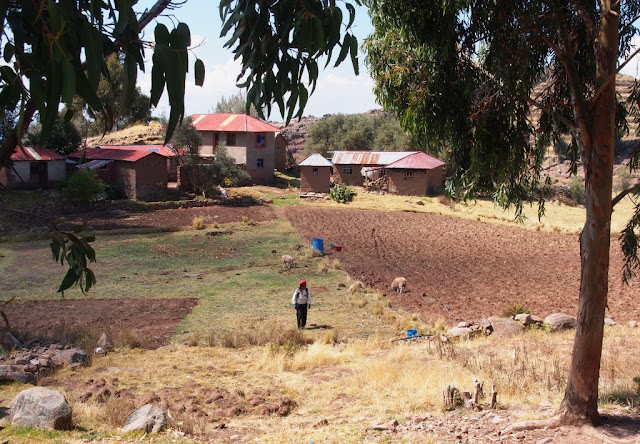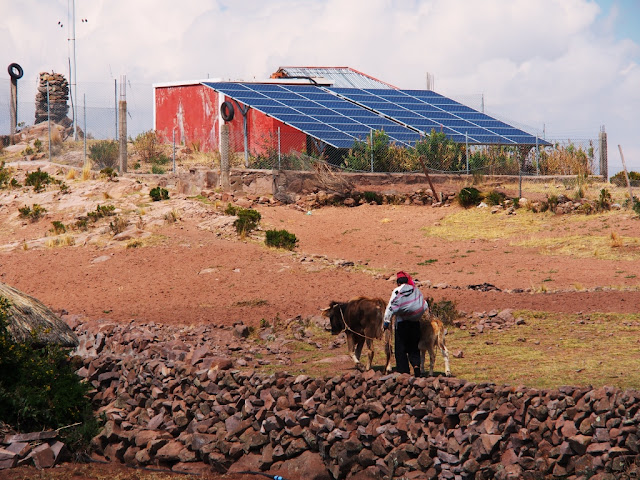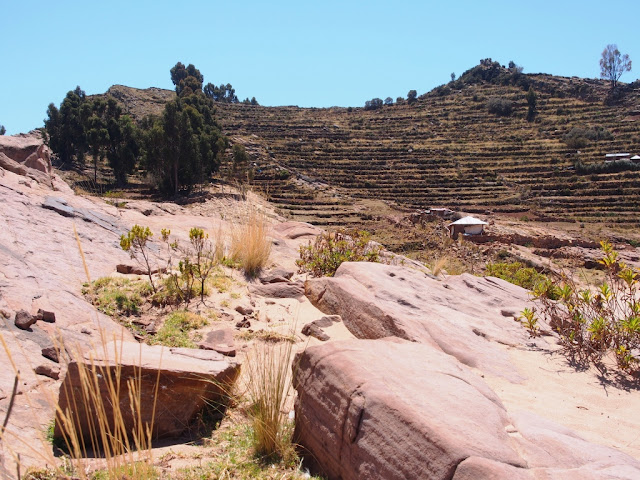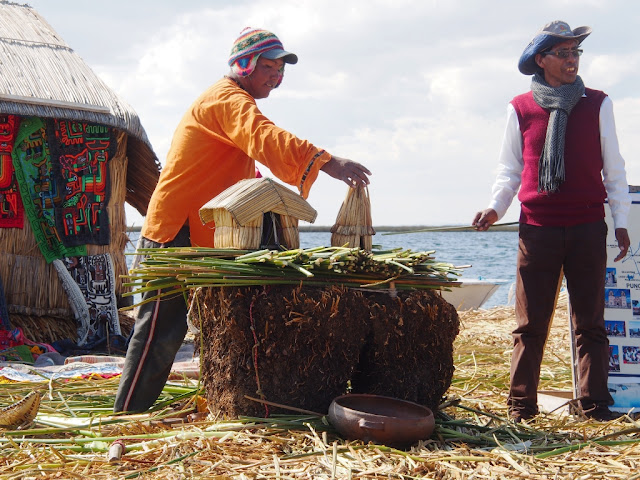Well today
was one of our most interesting and fun days of the tour. As we left the hotel
to catch a boat, we were greeted with bici-taxis, at least that is what they
are called in Cuba.
There is a seat for 2 in the front and the driver pedals the bicycle part behind you. I thought the traffic in Peru was pretty bad from a bus passenger's point of view. It's a little more scary on a bici-taxi because you have no protection and the guy can't speed up quickly to avoid an accident. Anyway, we all got to the harbour safely.
There is a seat for 2 in the front and the driver pedals the bicycle part behind you. I thought the traffic in Peru was pretty bad from a bus passenger's point of view. It's a little more scary on a bici-taxi because you have no protection and the guy can't speed up quickly to avoid an accident. Anyway, we all got to the harbour safely.
Lake
Titicaca is the second largest lake in South America and is 190 km long by 80
km wide. Bolivia also claims part of the lake as its own. We set off in a
covered cruiser with very comfortable seats.
Our guide, Pedro, was incredibly knowledgeable about the lake and the people we visited. He spoke English, Spanish, Quechua, and another language and easily translated back and forth as the people explained things to us.
Our guide, Pedro, was incredibly knowledgeable about the lake and the people we visited. He spoke English, Spanish, Quechua, and another language and easily translated back and forth as the people explained things to us.
Our first
stop was Taquille Island, with a population of about 2,000 people.
Their economy is based on fishing, terraced farming and tourism. Men are always knitting, even as they walk, and boys are taught the skill at the age of 6. Women, on the other hand, make the yarn and weave.
Their economy is based on fishing, terraced farming and tourism. Men are always knitting, even as they walk, and boys are taught the skill at the age of 6. Women, on the other hand, make the yarn and weave.
After a
lengthy tour, we had the opportunity to look at and purchase some of their
handiwork. The quality of the workmanship was exquisite. Homes have solar
panels for electricity, and some even have cell phones and TVs!
Their
society is based on community collectivism and their 6 leaders earn no money
for the job. Instead, it is a position of honour. Their motto is, “Do not
steal, do not lie, do not be lazy." Dogs are not kept on the island, but
cats are because they are useful creatures. People go into Puno for supplies
when they need to, but they much prefer the peaceful island life
.
.
School is
held on the island, and the teachers come from Puno from Monday until Friday,
then go back to Puno. Marriage usually happens around the age of 16, so not
many kids finish high school or go on to post-secondary education.
The wedding
'ring' the man wears is actually a belt woven by his wife. It is long and
folded in half. The outside is a beautiful, colourful design and the inside of
the belt is black and white striped. The white is wool, the black is the human
hair - his wife's!
We walked from one side of the island to the other, and enjoyed a sandy beach for a little while. I dipped my feet in the water and was surprised by how cold the water was.
It was
noonish by then so we travelled across the lake to a peninsula of the mainland
for lunch. We were served chicken, fish, (trout was introduced to Lake Titicaca
by Canadians), potatoes, vegetables and bread. I asked for chicken only and
didn't eat much of the meal as I didn't want to 'push it'.
After lunch
we went to one of the floating islands of Uros. There are actually around 42 of
them and we went to a very, very small one. I couldn't believe that 5 families
(28 people) live there. And a cat! I saw a black cat!!
The island
actually moves up and down gently which is quite a weird sensation. The people
were extremely friendly and welcomed each one of us onto their island by
shaking our hand and speaking a few words of greeting. Even the children
participated, including the tiniest, cutest little girl. She was so adorable, I
just wanted to take her home!
With the help of visual aids, we learned how the islands are made. It was a weird
sensation realizing the ‘ground’ underneath you was moving up and down. The
islands are anchored down to avoid floating throughout the lake and the totora reeds they are made of are even edible!
We were given the opportunity to go for a short boat ride in one of their traditional reed boats which held about 25 people. There weren't that many takers but of course I jumped at the opportunity!! There were no life jackets in sight but the water in the lake isn't all that deep, haha! As I boarded, that tiny little girl reached for my hand to help me onto the boat. I simply couldn't believe it! She must have been 18 months old or 2 years at the most. What an 'Awwwwwe' moment!
The ladies had crafts spread out when we returned and I'm glad I didn't buy a pillow cover before now, for I found a gorgeous one there. I'd much rather purchase from the person who made the craft, than from a store.
I could have stayed longer but I was the last one back on board the cruiser as it was. It was about a half hour to Puno then we got a van back to the hotel.
Pele took whoever
wanted to go for the orientation walk of Puno and I went, despite the fact that
it had started raining. She showing us the main boulevard or walkway leading to
a colourful square. Then we walked over to the local market.
After that,
she left us on our own and a group of us went back to the boulevard and browsed
in some of the shops. When someone suggested going out for supper, I decided to
join them, because I actually felt hungry for the first time in days. We ate at a
restaurant Pele had recommended and it was excellent. I ordered an appetizer -
alpaca kabobs, which came with potatoes, a bun, and some peppers and onions. We
finished in good time.
What a great
day!!
























































This comment has been removed by a blog administrator.
ReplyDelete